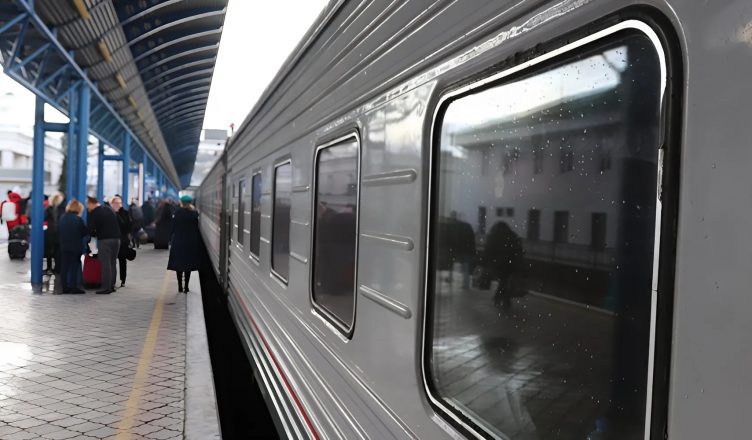Life bustled early in the morning at a small railway station in a provincial town. The platform was a canvas of movement and emotion—vendors shouting, train whistles screaming, children chasing pigeons, and passengers anxiously eyeing departure boards. People moved in all directions, dragging worn-out suitcases, clinging to plastic bags, sharing last-minute advice, or exchanging tight, quiet hugs before parting. There was a sense of routine to it all—until something unusual cut through the crowd’s rhythm.
A group of cheerful friends stood near the edge of the platform, their laughter and high spirits drawing the eyes of passersby. They had come to see off one of their own: a tall, lean young man in his early twenties, dressed simply, with a duffel bag slung across his back. His expression alternated between nervousness and a forced smile, as if trying to mask the weight of what lay ahead. He was leaving for military service, and like many before him, he was facing a future full of unknowns.
They joked, patted him on the back, took photos, and tried to make light of the seriousness of the moment. Someone handed him a small packet of letters to read during his service. Another slipped a religious charm into his palm. Through all the laughter, there was an undertone of sincerity, even fear. When the train finally pulled into the station, a hush seemed to fall over the group, and the young man, whose name was Alexei, hugged them one by one before boarding the carriage.
Time passed.
Months turned into a year. Letters were written, then gradually forgotten. Calls became rarer, and the world spun on. Military life was nothing like he’d imagined. It was harsher, lonelier, filled with discipline and silence, broken only by the noise of drills, boots, and orders barked in the early dawn.
Alexei changed. He learned not just how to endure, but how to observe. He noticed more than he spoke. He saw the pain behind forced smiles, the longing in letters that were read and reread. And in the darkest corners of cold nights, he clung to a single thought: the life waiting for him back home.

He imagined that day often—the return. He pictured his fiancée standing on the platform, waving as the train rolled in, eyes full of tears and joy. He had rehearsed the scene in his mind a thousand times, enough to believe it would come true.
Finally, the day came.
The train screeched to a stop at that same small railway station. The door opened, and Alexei stepped onto the platform, duffel bag in hand, breath caught somewhere between hope and fear. He scanned the crowd.
She wasn’t there.
Instead, standing a few feet away was a woman he didn’t recognize. She looked tired, her coat worn thin by the wind and time. In her arms, she held a child—a little boy, no older than two. The child clung to her neck, cheeks red from the cold.
Their eyes met.
She walked toward him with careful steps, as if unsure whether she had the right man. He didn’t move. When she finally stood in front of him, there was silence between them, the noise of the station fading into the background.
«Who are you?» he asked, confusion furrowing his brow.
She hesitated before answering, her voice quiet but steady. “I… I’m Elena. And this is your son.”
The words hit him like a storm. His hands went numb. For a moment, he thought she had mistaken him for someone else. But her eyes, full of recognition and a mix of sadness and resolve, told him otherwise.
«But… how?» he started to say, but stopped. The woman looked away.
“You remember that night before you left. You probably thought it meant nothing. I didn’t know how to tell you after. You were gone, and then time passed. I tried to write. I never knew if my letters reached you.”
He felt the weight of time pressing down on him. He couldn’t remember the last time he’d thought about that evening—not in detail. His memories were blurred by fatigue and distance. Yet here she was, holding a living, breathing child with the same eyes as his.
All the rehearsed scenes of his homecoming fell apart. The fiancé who was supposed to wait for him—where was she now? Did she even know? Did she move on, or did she simply choose not to come?
In that moment, Alexei didn’t feel betrayed. He didn’t even feel angry. He felt… still. As if the world had paused to ask him a question with no clear answer: What now?
He looked at the boy, who peeked from behind his mother’s shoulder. The child’s gaze was steady, curious. Not afraid.
And something shifted in Alexei. Slowly, he stepped forward, then reached out a hand—not to the woman, but to the boy. The child looked at him for a second longer before reaching back, tiny fingers gripping his.
No words were needed. Not yet. Life had not played out the way he imagined, but here it was, offering him a different kind of beginning.
Behind him, the train hissed, preparing for its next departure. Around him, people moved, unawar
